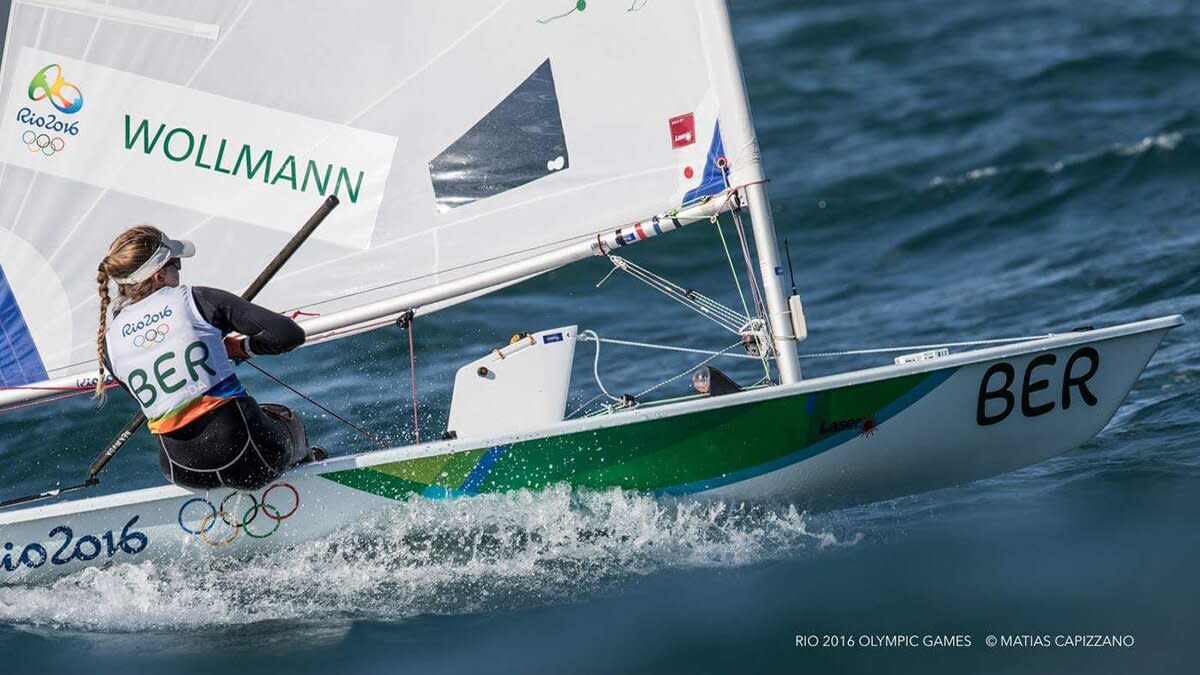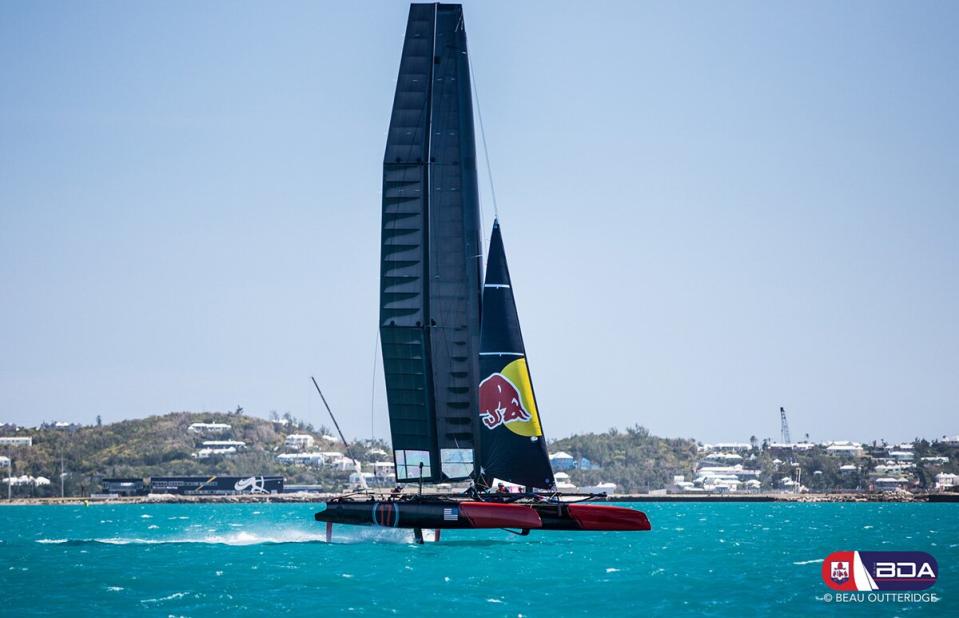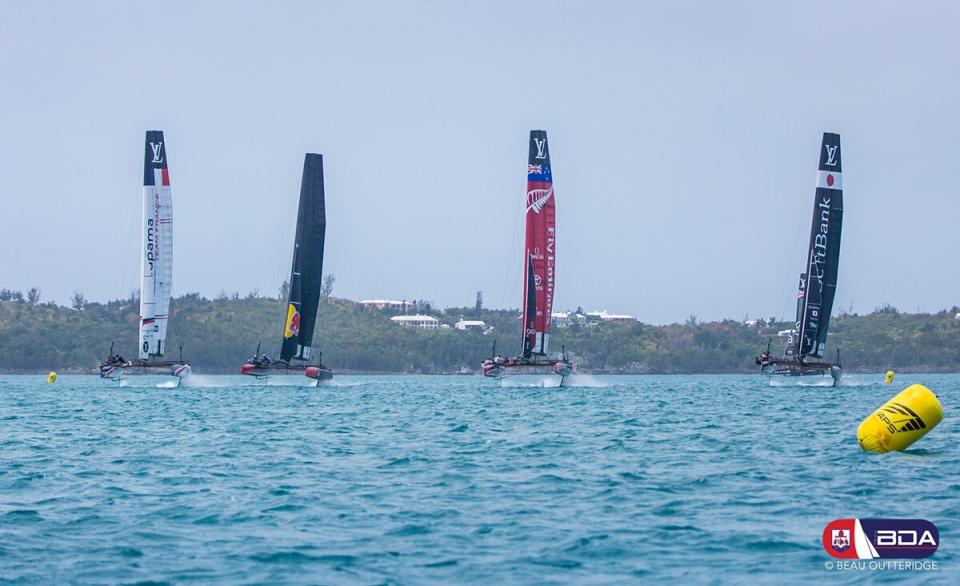Why Don't Men Take Women Seriously In Sailing?

- Oops!Something went wrong.Please try again later.
Waiting in the hotel lobby of Bermuda's Hamilton Princess & Beach Club on Sunday morning, Cecilia "Ceci" Wollmann could easily pass for one of the teens who celebrated prom at this luxurious harbor property the night before. But any faint sign of bags under the 19-year-old's eyes is less likely from late-night partying than from training extra hard for the 2017 Red Bull Youth America's Cup (RBYAC). We're meeting Bermuda's youngest Olympic sailor at this Fairmont Managed Hotel - the official hotel of the 35th America's Cup in Bermuda - to discuss this very topic: What it will take for women to break into the world's oldest international trophy sport.
Though America's Cup has been around for 166 years (it started in 1851), only a handful of women have sailed in the prestigious race. Dawn Riley was the first in 1992 and in 1995 on an all-female team that narrowly missed making the finals. In the 22 years since, women have only been a part of two America's Cup campaigns. Wollmann, who started sailing at age 8 and competed at her first Olympics in Rio de Janeiro last summer, is hoping to change all that. As the sole female out of nine sailors on Team Bermuda (BDA) and one of two women participating in the RBYAC, Wollmann has a real shot at winning on her home turf, er, ocean, and turning a few heads in the process.
Should Wollmann's team crush the competition on June 20 and 21, which is right in the middle of the 35th America's Cup finals week (here's the schedule), her male counterparts in the big leagues will likely take notice and this could be game-changing. Fun fact: Since RBYAC began in 2013, eight sailors have found positions on America's Cup teams, including Olympic gold medalist Peter Burling, who is the now helmsman for the Emirates Team New Zealand, the challenger up against two-time defending champion Oracle Team USA this week.
"When you're looking to build a winning team, you're looking for the best people for every job. It doesn't matter if you're male or female, where you're from, how old you are, what color you are, if you're rich or poor. The sport doesn't care. It only asks, 'Are you the best?'" says Jimmy Spithill, skipper of Oracle Team USA and a Red Bull athlete. Still, Spithill admits that it's not just about talent, but also opportunities and, unfortunately, those are quite limited.
There just aren't enough jobs for women on the boat, especially on this new type of racing yacht, which features hydrofoils-unique curved fins located on each hull and designed to lift the boat, much like a plane, allowing it to travel super fast just above water. Grinding pedestals (picture a hand cycle) are used to pull ropes and operate hydraulics on these futuristic vessels. As you've guessed, grinding takes an enormous amount of upper body strength, which doesn't typically favor women. America's Cup only offers five positions per boat, and three are grinders.
Female sailors have the added issue of the old boys' club all around-on and off the boat. That's what America's Cup had been for 131 years until Riley rocked the boat in 1992. And while she succeeded at climbing aboard against the odds, she admits there's a lot more work to be done, which can be both exhausting and discouraging.

"The next generation of women sailors, say 10 to 15 years younger, assume that others have smashed all the barriers and it's supposed to be easy or, at least, not as hard. They ask, 'Well, you did it, why am I not being treated equally? This sucks.' And then they go do something that's easier," Riley says. "To be fair, the person who does it first gets a lot of kudos and publicity. But the person who does it second isn't getting that same attention. No one is telling her she's awesome."
In other words, fighting for equality can be quite lonely. "I've gotten used to being the only girl on the team and training with the guys, "says Wollmann. "It's a little weird sometimes when they all have guy jokes with each other. But they're all super kind to me. Also, it's hard trying to keep up with them in the gym and when we run." Wollmann found herself putting in more training hours than her teammates early in the season to stay in competitive shape. "It's nice having our female manager, Laura Cutler, just to know someone else [like me] is there and understands."
Cutler, Red Bull TeamBDA manager, had her own thoughts on the subject: "Another obstacle is that all the current America's Cup teams are owned and managed by men. As far as I am aware, all of the sponsor companies are also run by male CEOs, with the sole exception of the Argus Group, sponsor of SoftBank Team Japan. If you were to talk to anyone involved in the America's Cup, they would agree that it is not a purposeful, conscious female shut-out-not at all. It is just trundling along the way it has always been, and since it is a highly successful event, there has not yet been a concerted effort to change."
America's Cup could take a cue from Volvo Ocean Race, an epic around-the-world sailing event that takes teams across four oceans and six continents. "They applied rules to allow and encourage more women on the boat: Each team can have up to seven or eight guys and two girls," Wollmann says.
Changing the rules to enforce coed boats is a terrific solution, according to Riley. "Being the only woman on a men's team and then on an all-women's team in America's Cup, I know that the only way to truly make a change is to have mixed teams. If men are skeptical that women can do it and are not there next to them, seeing and experiencing it, they will always come up with an excuse like, 'Oh, they got really lucky,' or 'They must have been on a fast boat,' or 'They had more money.' They're always finding reasons why women were not just as good or better, but that they had some advantage. So you have to have men and women together, just like in business, and just like in life."

"There are some great things happening in the sport," Riley adds, "but America's Cup just isn't there. If they think that equality is having 'Ladies' Day,' where female spectators wear fancy hats to spectate racing, they have a little work to do."
Fancy hats aside, some positive progress is being made this year in Bermuda, the host country, that could impact upcoming America's Cups, which is moving to a two-year cycle rather than every three to five years. The Hamilton Princess & Beach Club, where we sat down with Wollmann, is one of the sponsors of the America's Cup newly launched Endeavor program, designed to educate and train the sailors of tomorrow. In the U.S., Riley is the executive director of Oakcliff Sailing, a training and coaching center to create and fast-track sailors for America's Cup, the Volvo Ocean Race, and the Olympics. Other programs like these, including The Magenta Project, exist to advance women in sailing around the globe.
Here's hoping that Wollmann's presence on TeamBDA will continue to make the case for coed teams. "I'm trying to get my foot in the doorway in anything really," says Wollmann, who starts training for the 2020 Olympics in Tokyo this July. "I really love sailing. It's really cool to be out on the water every day on this amazing boat."
Tune in to see if Ceci Wollmann's TeamBDA wins The Red Bull Youth America's Cup Finals, which will be streamed live on Red Bull TV on June 20 and June 21, 2017 at 10am PT.

